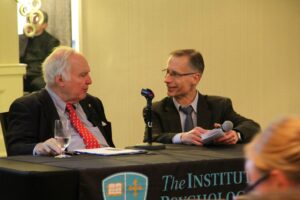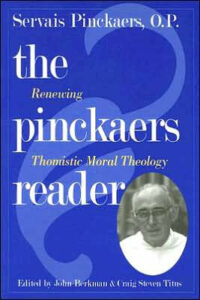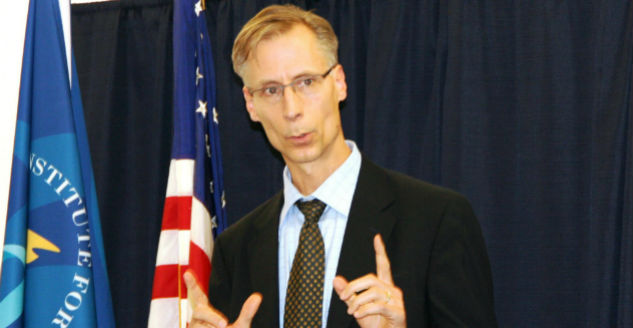It’s not an exaggeration for Dr. Craig Steven Titus to claim that it’s a small world or that God is really present with people in their everyday lives. While pursuing his Doctorate of Sacred Theology at the University of Fribourg (Switzerland), he encountered Dr. Gladys Sweeney, former dean of Divine Mercy University’s (DMU) Institute for the Psychological Sciences (IPS). She introduced him to the University and, as the saying goes, the rest is history.
At DMU, Dr. Titus serves as professor and director for the Department of Integrative Studies. He has also written a book titled Resilience and the Virtue of Fortitude: Aquinas in Dialogue with the Psychosocial Sciences (CUA Press, 2006), edited 10 books, and published numerous articles.
His commitment to research and teaching goes beyond one specialization; his expertise consists of an interdisciplinary understanding of theology, philosophy, and mental health practice.
During a meeting with Dr. Titus, you will quickly learn that he’s prompt, action-oriented, and detailed, yet he’s still able to laugh.
Interestingly enough, after nearly 16 years at DMU, he still considers his students as a prized asset and finds his multi-disciplinary work with colleagues to be “fascinating.” Here’s what he had to say about his work at Divine Mercy University.
Q: How long have you been a faculty member at Divine Mercy University and how did you get involved?
Dr. Titus: I’ve been involved in different ways since 2002, when I was first hired as assistant professor to teach the integration courses. It was the year prior to that that I came to know the university because of its first dean. Former IPS dean Gladys Sweeney came through Switzerland, in route to Rome for a conference, with some students. She had invited Fr. Servais Pinckaers to speak to the students on the theme of happiness. However, since he fell ill, he asked me to speak in his stead. At that time, I was finishing up my doctoral dissertation at the University of Fribourg (Switzerland). After giving the lecture, Dean Sweeney suggested that I present my candidacy for the position at IPS that was free because Fr. Benedict Ashley was retiring. Fr. Ashley was the theologian-philosopher who first designed and taught the philosophy and theology courses that prepared for the integration of Catholic thought and the psychological sciences. My experience in dialogue between theology, philosophy, and psychosocial research on resilience and the virtue of fortitude prepared me for work at Divine Mercy University.
Q: Which courses do you teach and how do they add value to the university’s overall mission?
Dr. Titus: I teach classes on: philosophical and theological anthropology; practical reason and moral character; and marriage and family. The courses are formative of the clinicians’ Christian identity and understanding of the person. They engage the student’s mind and heart in wisdom from theological, philosophical, and mental health sources. These courses train the students to see the whole person, family, and society, to enrich their vocation to heal. Of course they need further integration training in the University’s clinical classes to become competent in mental health practice as a whole. The integration thread throughout all the courses promotes an understanding of the person in terms of the origins, development, and flourishing of the person—in everyday and ultimate perspectives, which include issues of human nature, relationality, and God.
The students come to the university because of its commitment to the Catholic-Christian understanding of the person, family, and society. Students appreciate being taught to see more of the person, including the person’s callings to commitments and truth, to interpersonal relationships, and to a future that gives meaning to the present.

Image Caption: Dr. Craig Steven Titus, director of the Newman Lecture Series, speaks with the late Dr. Michael Novak before the 2015 lecture begins.
Dr. Novak was a Roman Catholic social philosopher and a professor at Catholic University of America .
The Newman Lectures feature speakers who are widely recognized for their contributions to the fields of psychology, moral and political philosophy, theology, and law. This lecture series is held under the sponsorship of Divine Mercy University and seeks to promote an international conversation among various disciplines that treat the human person.
Q: Are there any particular resources used in your courses that you feel are unique from other counseling or psychology programs?
Dr. Titus: One of the major differences between courses at DMU and those at a secular counseling and psychology program are the sources that underlie one’s vision of the person. A Catholic-Christian vision of the person is rooted in the sources of reason and faith that protect the psychological sciences from reductionism, that is, seeing too little of the person, family, and society.
This vision of faith and theological reflection is rooted in the experience of the Word of God found in Sacred Tradition and Sacred Scripture (the Bible)—teaching that is passed down through the succession of the apostles. This Catholic-Christian perspective is found in: the patristic reflections of the early Church writers (such as St. Augustine); the Magisterium (such as St. John Paul II, Benedict XVI, and Pope Francis), including the Councils (e.g the Second Vatican Council). It draws upon the writings of men and women, who throughout the Church and the ages have carried the message of Christ forward.
Other sources of wisdom are Christian and non-Christian philosophy from Plato, Aristotle, Boethius, and so on. And of course, there are the sources wisdom from current psychological sciences, evidence-based techniques, and best practices in the mental health field.
In drawing from the psychological, philosophical, and theological wisdom traditions, we are convinced that, since truth is one, there is something very important to be learned by the psychological sciences and the practice of counseling. These new sciences offer further understandings of how people can experience suffering, anxiety, and depression, and how they can find ways to come out of those difficulties using the means that are necessary and helpful – including psychotherapy, group therapy, psychopharmacology, and everyday contact with people, which also can be therapeutic.
Q: What has been the most rewarding part of teaching at Divine Mercy University?
Dr. Titus: Perhaps it’s the classic response, but the most rewarding part of teaching at DMU is the contact with the students. Together with the students, the instructors engage wisdom, understanding, and knowledge vital for mental health professionals. I support very strongly the unity of the human person and the importance of their experience. Even in our diversity of cultural experience, there is wisdom, there is truth. When one seeks to teach and share experience, while recognizing the dignity of each person and God’s presence in it all, it’s really an experience of learning as well as teaching.
Our students are highly motivated and committed to the program. Their active participation allows me also to have feedback from them about their experiences, the reality of being a community, and their search for the truth of the person, family, and relationships.
The classroom becomes a type of community of inquiry seeking together to understand more about experiences of difficulty and failure as well as of life, love, and flourishing.
Q: Who has inspired you throughout your career?
Dr. Titus: I have two primary mentors in my life:
– Fr. Servais-Théodore Pinckaers: it’s because of him that I went to Europe to  study. He was a leader in the renewal in the Catholic Church that sees morals as being rooted in the virtue of Charity-love—God’s love, a friendship love—and in the movement of the Holy Spirit. Fr. Pinckaers’ approach to moral action and spiritual life is both normative and virtue-based. He affirms the importance of acts, agents, purposes, vocations, and being open to transcendence (that is, God, including the gifts of the Holy Spirit).
study. He was a leader in the renewal in the Catholic Church that sees morals as being rooted in the virtue of Charity-love—God’s love, a friendship love—and in the movement of the Holy Spirit. Fr. Pinckaers’ approach to moral action and spiritual life is both normative and virtue-based. He affirms the importance of acts, agents, purposes, vocations, and being open to transcendence (that is, God, including the gifts of the Holy Spirit).
– And the other primary mentor is Fr. Benedict Ashley: it’s because of him that I was hired at DMU. He set up the integration program at DMU. His study of Catholic anthropology, morals, and bioethics prepared him for dialogue with the psychological sciences. In parallel, my study of resilience (psychological sciences) and the virtue of fortitude (based on the thought of Thomas Aquinas) prepared me for dialogue with the psychological sciences, drawing on the model used by Fr. Ashley.
Image Caption: Book cover for Servais Pinckaers’ piece on “Renewing Thomistic Moral Theology, published by Catholic University of America and edited by Dr. John Berkman and Dr. Craig Steven Titus.
Q: Are you involved in any research teams or professional associations or organizations that have helped you stay current in the field?
Dr. Titus: I belong to seven professional associations – including The Society of Christian Ethics and American Catholic Philosophical Association, and the Catholic Psychotherapy Association (as an academic member). I think that the best way to stay current in the fields that I am concerned with is through engagement in research and dialogue. The co-editing of and the contributions to the Catholic-Christian Meta-Model*Volume has involved extensive scholarship – the bibliography is 60 pages long.
If I had taught philosophy or theology at a different university, I would have been centered within one discipline or one specialization. But, by the nature of Divine Mercy University we take a multidisciplinary approach – where philosophy and theology are required to dialogue with psychological sciences. This interdisciplinary commitment complements specialized research and prepares for integrated clinical work.
To be engaged as a philosopher and theologian with psychologists, I have had to be attentive to the meanings of terms, the methods of research, and the way that truths about the person and relationships are communicated. For example, understanding human experiences of attachment, caring, and charity-love, can be integrated by a Catholic-Christian Meta-Model of the person, which includes psychological findings (e.g., through attachment theory on secure attachments), philosophical reflections (e.g., on virtues such as benevolence and friendship), and theological insights (e.g., on vocations and God’s love for every person). Such an interdisciplinary approach enriches our understanding of the person (e.g., because of the inclusion of vocations and virtues), thus benefiting the mental health field, in general, but also the client, in particular. There is great benefit when the three sources of wisdom work together for each person.
*The Catholic-Christian Meta-Model of the Person – presented by university faculty and other collaborators – is a forthcoming volume of research that elaborates a basic training approach for integrating a Catholic-Christian understanding of the human person, psychology and mental health practice. Download a copy of the foundational document “Psychological, Theological, and Philosophical Premises for a Catholic Christian Meta-Model of the Person.”

